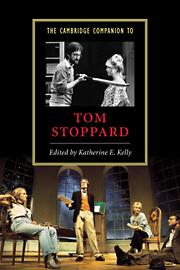Book contents
- Frontmatter
- Chronology
- Introduction
- PART 1 BACKGROUND
- PART 2 THE WORKS
- 3 Narrative difficulties in Lord Malquist and Mr Moon
- 4 Stoppard’s radio and television plays
- 5 Stoppard and film
- 6 The early stage plays
- 7 Travesties, Night and Day, The Real Thing
- 8 Tom Stoppard and politics
- 9 Stoppard’s Shakespeare
- 10 Science in Hapgood and Arcadia
- 11 The comedy of Eros
- PART 3 CULTURE AND CONTEXT
3 - Narrative difficulties in Lord Malquist and Mr Moon
from PART 2 - THE WORKS
Published online by Cambridge University Press: 28 May 2006
- Frontmatter
- Chronology
- Introduction
- PART 1 BACKGROUND
- PART 2 THE WORKS
- 3 Narrative difficulties in Lord Malquist and Mr Moon
- 4 Stoppard’s radio and television plays
- 5 Stoppard and film
- 6 The early stage plays
- 7 Travesties, Night and Day, The Real Thing
- 8 Tom Stoppard and politics
- 9 Stoppard’s Shakespeare
- 10 Science in Hapgood and Arcadia
- 11 The comedy of Eros
- PART 3 CULTURE AND CONTEXT
Summary
Tom Stoppard’s early Lord Malquist and Mr Moon leaves critics in an awkward situation. It is sufficiently substantial that no one tracing Stoppard’s career can afford to ignore it. But since it is the only novel by a man universally classified and acclaimed as a “playwright,” it is difficult to know precisely what to do with it. As a result, critics usually treat it as a dry run for the plays to come.
Before discussing how they do so, let me provide a summary, since the novel is not widely known. Moon is a hapless historian aspiring to write a history of the world, one that articulates the “patterns” governing “all the things which have made things turn out the way they have today” (p. 128). But in part because he has a phobia about the infinite (especially the infinite regress brought on by the search for first causes), he is unable to get down even the first sentence. As a stopgap, he takes a job as the Boswell to Lord Malquist – an aristocratic (and, we eventually learn, bankrupt) aesthete. These two provide the central contrast of the book. Moon, terrified by his inability to take a clear stand or draw clear boundaries, wanders around with a bomb in his pocket, in the hopes that he can explode reality into some kind of sense; Malquist, committed to style over substance, blithely buffers himself from reality, including the fact that his horse-drawn carriage has run down a Mrs. Cuttle who (we later learn) had apparently mistaken it for a similar-looking vehicle being used in a promotional campaign for toilet paper.
- Type
- Chapter
- Information
- The Cambridge Companion to Tom Stoppard , pp. 55 - 67Publisher: Cambridge University PressPrint publication year: 2001



